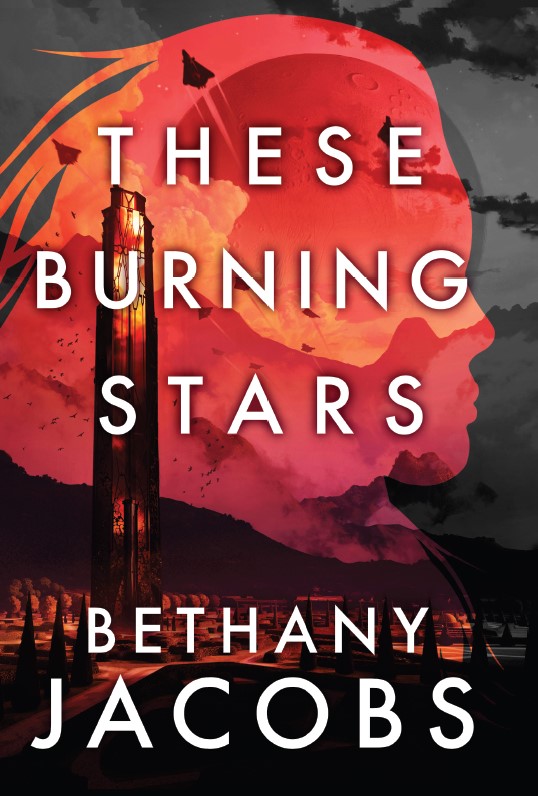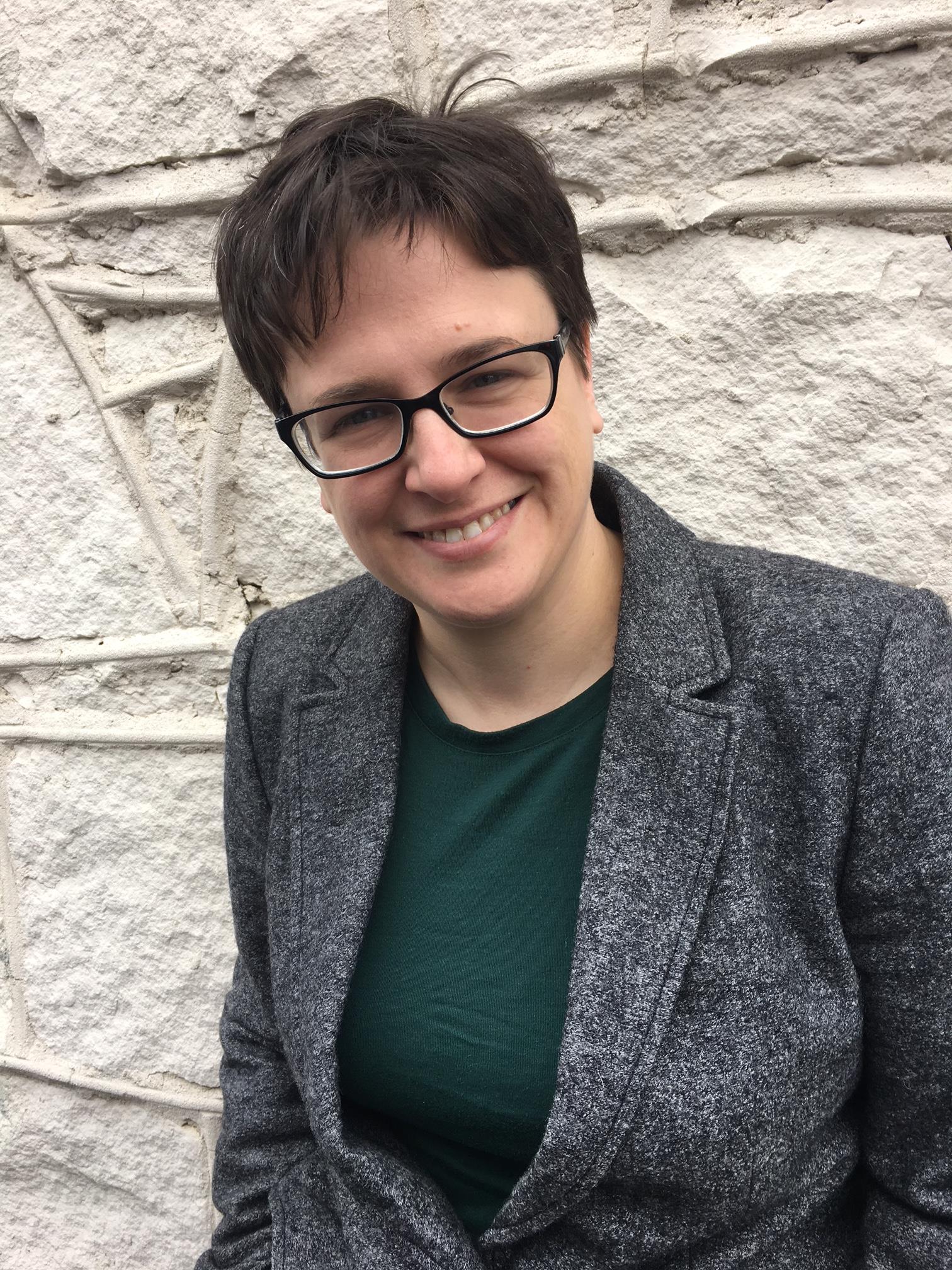by Kate Tooley
The first time I met Bethany Jacobs was shortly after the release of her debut novel, These Burning Stars, in late 2023. We’d sat yelling distance from Union Square, freezing and eating tacos in one of the semi-enclosed outdoor dining areas that are now permanent relics of the pandemic. In the time since we spoke, These Burning Stars has won The Philip K. Dick award, and its sequel, On Vicious Worlds, is available for pre-order, releasing in October 2024.
For this interview, we met in another piece of everyday life that was born, or at the very least, given scope, during lockdown: zoom. Behind Bethany, I can see framed photos: selfies, faded family portraits, one of a little girl grinning with her mouth wide open. There’s art and an antique lamp, and fabric bound books, but the edges of the frame cut me off there. As we catch up on her travel and news about the book, I can’t help thinking about curated spaces, what we choose to show and what we choose to hide both in our zoom backgrounds and in the stories we tell – probably because one of the things that Jacobs does so well in These Burning Stars is curating what we know and when we get to know it.
When I get the chance to speak to other genre writers and especially queer genre writers, I’m always curious to get their take on the historical separation of literature into highbrow and lowbrow and the way genre fiction spent most of its history firmly shoved into the second category.
After a deeply felt “oh my god” and a sigh, Bethany gets right to the heart of things, saying, “I think it’s bullshit, honestly… one of the things that’s interesting when you think about that history is that it’s very much informed by this misunderstanding of the origins of sci-fi and fantasy. The modern understanding of Sci-Fi starts with Mary Shelly, but the tropes of both go back centuries and are often attached to very serious writers. I think the idea that they’re separate comes down to the pulps of the early 20th century…they’re considered inherently unliterary because they’re what lower- and middle-class people read. They’re economically accessible, and so they must be lesser.”
She sidebars to note that, of course, so many of those pulps were badly written and grounded in racist, homophobic tropes, but says, with what I’m already mentally categorizing as Bethany’s gotcha grin, “That’s true of literary fiction too… it all comes back to this classist idea that what’s popular isn’t serious…and that’s how we wind up degrading Taylor Swift, which is really just degrading young girls.”
The point, Jacobs says, leaning forward at her desk, is that “we need both… if we could stop attaching some kind of moral or aesthetic superiority or value, we’d be much happier.”
Her expansive approach to the genre and the topics that obsess her, including religion, history, and politics, make sense in the context of her early influences, including the Narnia books, Brian Jacques’s Redwall series, and the works of Madeleine L’Engle. And just as impactful for her as these authors were film and TV, shows like The X-Files and, in particular, Xena Warrior Princess:
“The way that series explores relationships, centers women, and was about themes of redemption and violence and the loss of innocence and friendship and courage… impacted me deeply from a young age.”
During college, Jacobs shifted her focus to literary fiction, but it wasn’t too long before she returned to her first loves. During grad school, she re-embraced her love of genre fiction, first via Octavia Butler and then immersing herself in the work of authors like NK Jemisin, Yoon Ha Lee, and Neon Yang.
“There became this explosion in my life of genre fiction, and it was almost exclusively engaging with queer politics.”
Press around Jacobs’ book has consistently centered her own queer politics, in particular, a unique feature of her worldbuilding: in These Burning Stars, people choose their gender rather than having it assigned. I ask if she thinks she’s part of queering her genre, and the enthusiasm in her response feels familiar to many conversations I’ve had in the queer genre community:
“When I think about whether or not I’m queering the genre, I think of it as stepping into a conversation that has already been queered. I’m joining a table where this conversation is happening, and all the people I like are hanging out. And they’re saying that, yes, over there, at this other table, there’s another history of white hetero cis male writers, and their work has informed our genre, but we want a new menu.”
We chat for a while about the ways science fiction, fantasy, and horror are ripe for queerness. She points out that “science fiction with its exploration of alien experience…is familiar to queer people. So many queer people feel like the world treats them like a different species…those genres give us a space, give us tropes to map our own identities. It’s cathartic and pleasurable at the same time.”
An interesting facet of These Burning Stars is that while the gender system is touted in reviews, the queerness in the book, while not untroubled, isn’t a central tension point.

“There’s a couple ways to think about the queerness. There’s the gender queerness and the sexuality. In this world, it’s very normal to have any number of sexualities. Part of that is a sort of wish fulfillment on my part… giving visibility to the kinds of love stories and identities that we want to see in the world.” She laughs and shrugs before hitting at the heart of it: “Creating a queer-normative world lets us focus on things that are more interesting.”
Jacobs does think it’s important to stress that while gender in the book is not binary and something people can both choose and change, she’s leery of people thinking she was trying to imagine some kind of gender utopia, pointing out that in the world of the book “identity is still based on gender.”
In the novel, once a person chooses, they’re given a “gender mark,” and Jacobs explains that in this world, a person without one would be incredibly distressing. Sidestepping spoilers, there’s a subtly powerful moment where a character is referred to as “it,” and it demonstrates so clearly that having an acceptable and codified gender in this world is still the thing that defines your humanity. Jacobs tells me that, “In our own world, when we can’t identify someone’s gender, they might as well not have a gender, and we use that as an excuse to dehumanize them.”
For Jacobs, the issue is even more thorny because “there’s an implication in (the world of the book) that that could mean there are no trans identities…. On one hand, it would be great if it was that easy for trans people to identify as the gender they know they are. But does the loss of, the absence of trans identities mean a loss to this culture? I think it does. I think a world without trans people is a loss.”
Much of These Burning Stars investigates lost or manipulated histories and the ways oppressed peoples attempt to recover them. I ask Jacobs her thoughts about the way authors can and do use fantasy/sci-fi to fill in these gaps.
“I think that one of the problems with how whiteness frames historical recovery is that it is very fixated on framing and prioritizing suffering. And it’s very important to communities who have experienced oppression and suffering to also recover and acknowledge those histories. But if you look at a genre like Afrofuturism it’s looking at rhetorics of resistance to oppression and at joy. I think that’s also true of queer writers. It’s not just that we are victims… but that we are these people, particularly of queer drag and club communities, who are trying to put our joy at the forefront of how we’re surviving. All of that invites a belief in the future. We’re doing that because we believe there’s a future for us, and we’re going to fight for that future.”
This discussion of history is deeply embedded in the novel: the price her characters are willing to pay to try and remake their world: to reclaim culture and family and history at tremendous personal cost. Jacobs is propulsive when she speaks to her passions, whether on the page or in an interview:
“There’s a lot of nihilism… but there are a lot of communities that don’t historically have the luxury of nihilism. Their communities are on fire, and so they have to fight for a future because it’s not the abstract fight that it is for a lot of privileged people. What I find delicious about sci-fi is that it’s a way to imagine that there is a future…. It’s not about giving into this idea of historical suffering; it’s about this idea that we get to keep living and that we fight to keep living.”
Jacobs pauses, one hand caught mid-gesture, and says, making eye contact: “I don’t think utopia is real, but I think the struggle is righteous.”
Speaking to Jacobs has left me even more excited for On Vicious Worlds, which will delve deeper into the themes of the first book and explore the fallout of the choices made in These Burning Stars. She also teases another novel on the back burner, one in which gods are periodically born from the dead. I’m immediately ready to preorder, but unfortunately, it looks like it will be another year before she begins work on that project.
For now, we’ll all just have to hold tight to see what’s next for Jacobs and her characters.
***
Bethany Jacobs is a former college instructor of writing and science fiction. In 2019, she made the leap to the tech industry so that she would have more time to write. When not working on her novels, she is an introvert of predictable habits. She likes reading, cooking, writing fanfiction, and snuggling in bed. She lives in Buffalo, New York, with her wife and her dog. She is the winner of the 2024 Philip K. Dick Award, and she has been nominated for the BSFS Compton Crook Award. These Burning Stars is her debut novel.
When asked about organizations she’d like to direct support to, Bethany mentioned: The Trevor Project, Achieving the Dream, and The National Network of Abortion Funds.
Kate Tooley is a queer writer originally from the Atlanta area, currently living in Brooklyn. They write about the sticky corners of gender and sexuality; complicated families; and the myriad ways in which we become haunted. They hold an MFA in Creative Writing from The New School and are an Assistant Editor at Uncharted Magazine.
